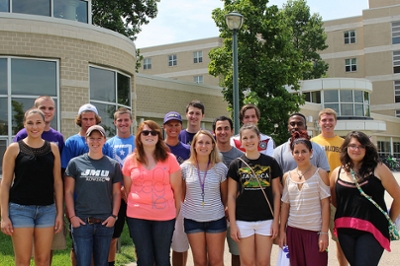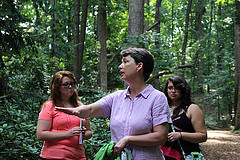Designing video games builds engineering community
College of Integrated Science and EngineeringBy: Julie Stern
Posted: January 20, 2015
 In December, thirteen freshman-engineering students presented video games designed for second-graders as part of a semester-long project. The students all belong to the engineering Residential Learning Community (RLC).
In December, thirteen freshman-engineering students presented video games designed for second-graders as part of a semester-long project. The students all belong to the engineering Residential Learning Community (RLC).
The video games were designed in order to provide a solution to a learning issue prevalent for second-graders in Rockingham County and Harrisonburg. The engineering students were divided into three groups to develop working prototypes of their games. The only requirements were that the games use MaKey MaKey (an interface system that makes everyday objects operate on the computer) and that they mimic a biological system found within the Edith J. Carrier Arboretum ecosystem.“The more we practice the process, the more efficient we will be in the future,” said Wyatt Jamkauskas. “I think it will really benefit us for the long-term.”
“Making the video game wasn’t that difficult once we had the right software,” said Destiny Foley.
Foley’s team designed a video game that corresponded with a board game. The premise of the game is to help an ant that accidentally fell out of a tree in the arboretum, reunite with his parents. As players move the ant along the board game, which connects to the computer, various questions appear on the computer screen for the players to answer.
The two other groups developed games that worked solely on the Internet, using MaKey MaKey to connect handmade controllers to the computer. One controller was made out of a candy box and covered with paper; another, wired through Styrofoam and wrapped in electrical tape. Each game was designed to challenge second-graders with math, science, or reading questions, while educating the children about the ecosystem.
Dr. Kyle Gipson co-taught the class along with Dr. Jacquelyn Nagel. He first introduced the students, all belonging to the engineering Residential Learning Community (RLC), to the project during a Bio-Inspired Design Quest in August. During the quest, geographic science assistant professor Dr. Amy Goodall led the students on a tour of the arboretum to learn more about the biological ecosystems at work. After the tour, students were introduced to the project.
“The principal purpose of the project is to get students in RLC to work together and build a community of support,” said Dr. Nagel. “The project is disguising what they’re really learning, such as how to use hardware and design software, and understand the needs of the second-graders. The students begin to incorporate what they learn from other classes and develop meaningful connections.”
The students followed a process: discover, ideate, prototype, implement. Throughout this process, they talked to local second-grade teachers to cultivate a better understanding of the need for interactive games, before creating ideas and building a prototype.
“The more we practice the process, the more efficient we will be in the future,” said Wyatt Jamkauskas. “I think it will really benefit us for the long-term.”
After the presentation, guests—including a second-grader—had the opportunity to test the games. Thinking in retrospect, a few students said they might do things a little differently a second time around.
“We might have made our game easier for second-graders to understand,” said Kassy Baltazar. “We didn’t interact very much with students that age, which I think may have made a difference.”
“The program we used was somewhat limited in terms of what we could do, and that was challenging,” added Bailey Swayne.
Other groups said they would have improved their group communication and time management; unexpected challenges occurred while developing the games and students had to make adjustments. But overall, the students agreed, designing the games was a valuable, hands-on introduction to engineering.
This is the first year of the engineering RLC, and the first time the video game project has been implemented. In time, Dr. Nagel hopes, the project will continue to inspire a community of students and help them build lasting connections.

